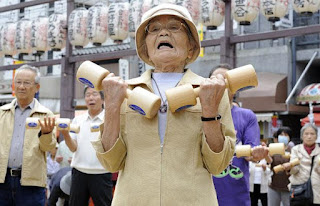Japan in 2016: A Year at the Look Ahead
Japan in 2016: A Look at the Year Ahead
From the very first speech until the last panel, the event began and ended with a focus on Shinzo Abe's future in 2016 as the current prime minister. Keynote speaker Tsuyoshi Sunohara, a senior writer at the Nihon Keizai Shimbun (more commonly known as the Nikkei) gave specific insights into the challenges Japan faces in the months ahead, from gains and losses in foreign policy throughout the rest of Asia, as well as who could be the worthiest politicians to take on Abe in the summer election.
The first panel of the day began with a focus on Japan's domestic affairs. True to the nature of this symposium, the panel consisted of Sunohara, moderator James L. Schoff of the Carnegie Endowment for International Peace, Yuki Tatsumi of the Stimson Center and Scott Seaman of the Eurasia Group. Though each panelist had their own niche of expertise, the main topics of discussion at the table shifted from Abenomics 2.0 to the projected consumption tax hike to an in-depth analysis of Abe's stronghold as prime minister.
Before the second panel began, Ambassador Sung Kim gave a presentation detailing the U.S. government agenda for 2016. His remarks were off the record. The second panel, in contrast with the first, brought U.S.-Japan experts together to look at Japan's future from an international angle. The participants included moderator Ambassador Rust Deming, Wendy Cutler of the Asia Society, Jeffrey Hornung of the Sasakawa Peace Foundation, and Narushige Michisita of the Wilson Center and the GRIPS Japan. This time, the two central topics of note were the implementation of the TPP as well as Japan's new security legislation.
The event was well-attended by U.S.-Japan scholars from all fields.
Though all the panelists brought many viewpoints to the stage and
discussed at length the contents of Japan's future in the upcoming year -
from relations with Russia, China, India, and a range of other
countries to the controversy of paternity leave for Diet members - one
thing remains certain. Sunohara, in his opening speech, summed it up as
so: "Japan's relationship with the US and the rest of the world is like gardening - it must be tended to, day by day."
This event was livetweeted through JASW's official Twitter account, @jas_wdc. To see a "curated" version of this blog post, which includes supplementary tweets and images in addition to the text, please see this Storify article.






Comments
Post a Comment